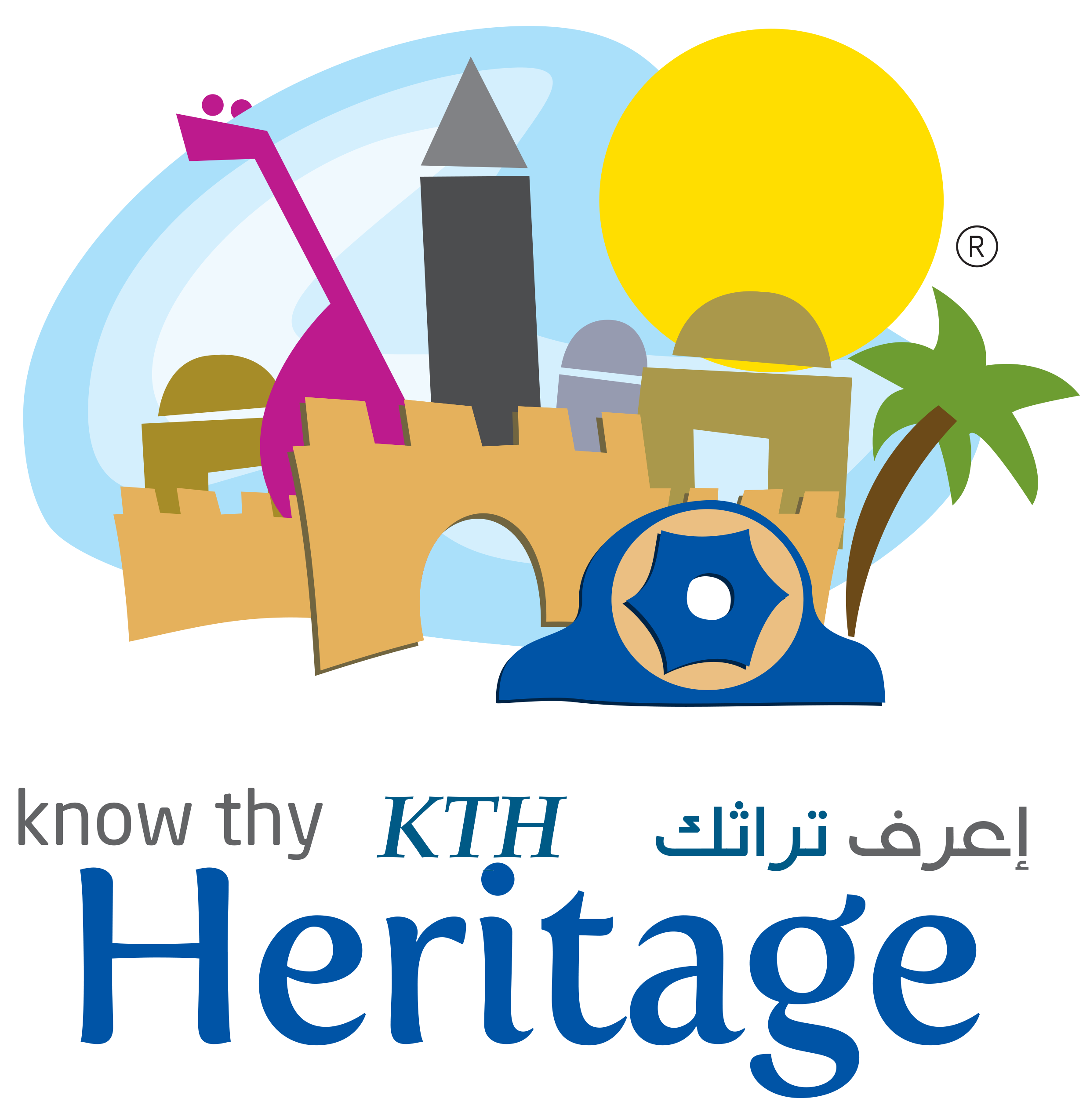Palestinians diaspora youth Return home from 7 Countries
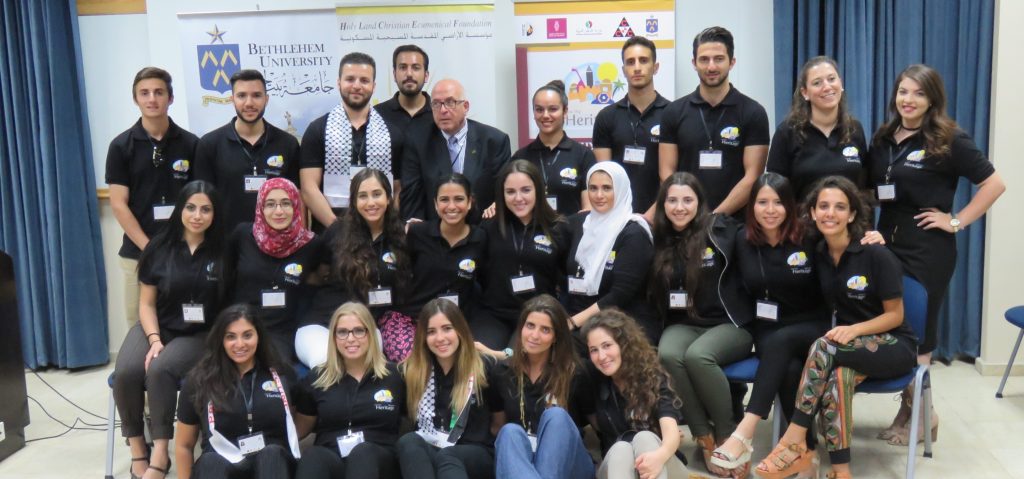
Bethlehem, Palestine—The Holy Land Christian Ecumenical Foundation (HCEF) welcomed its 7th annual Know Thy Heritage (KTH) Delegation to Jordan on Thursday, July 6th. Each year, a delegation of 25-30 diaspora Palestinians from around the world participate in HCEF’s Know Thy Heritage (KTH) Leadership Program to “Explore and Live Palestine,” where they strengthen their knowledge of their Palestinian identity, culture, history, traditions, and learn more about Palestine’s economic, political, and social context.
The delegation represents four continents and seven countries, reflecting diverse professions of special import to the development of Palestine such as business, finance, law, medicine, communications, education, and more. As part of HCEF’s Know Thy Heritage(KTH) Leadership Program to “Explore and Live Palestine,” Diaspora Palestinians from around the globe embark on a two-week journey to strengthen their knowledge of their Palestinian identity, culture, history, traditions, and to learn more about Palestine’s economic, political, and social context.
The Journey Begins!
 On Friday, July 7th, Palestinian young professionals from 7 countries and 4 continents gathered in Amman, Jordan before embarking on their journey to their homeland. Sir Rateb Rabie, who has been leading the journey for 7 years, welcomed the delegation during a morning orientation. Following the orientation, the delegates convened for a workshop with head of the Palestine International Institute, Dr. Asad Abdul Rahman, who discussed the conditions of Palestinians living under occupation.
On Friday, July 7th, Palestinian young professionals from 7 countries and 4 continents gathered in Amman, Jordan before embarking on their journey to their homeland. Sir Rateb Rabie, who has been leading the journey for 7 years, welcomed the delegation during a morning orientation. Following the orientation, the delegates convened for a workshop with head of the Palestine International Institute, Dr. Asad Abdul Rahman, who discussed the conditions of Palestinians living under occupation.
The delegation was hosted by the Catholic Center for Studies and Media at Na’our Parish where they met with youth from several Jordanian organizations. Fr. Rifaat Bader, Director of Catholic Center for Studies and Media, moderated a discussion between the Delegation and Jordanian youth, brainstorming how they can work together to bring about change in their communities. The gathering ended in a dinner with traditional Jordanian cuisine, music and dabkeh.
Despite having been held by Israeli security for 6 hours on the border of Jordan and Palestine, the delegation arrived to Bethlehem on July 8th with energy, enthusiasm and eagerness to connect with their fellow Palestinians. For many of them, this marked the first time they had ever set foot on Palestinian soil.
Finding Hope in the Oldest City on Earth
 On Sunday, July 9th, KTH officially kicked off its first full day in Palestine with a visit to Jericho, Bethlehem and the Dead Sea. The day was a mix of taking in historical sites, and appreciating the incredible diversity of their Palestinian heritage. The journey started in Jericho, where the delegation visited an archaeological dig testifying to Jericho’s status as the oldest city on earth. Nearby, they visited the site of Jesus’ baptism in the Jordan River, where John the Baptist prophesied and ministered. Later, they traveled to the end point of the Jordan River, where they swam in the lowest point on earth: the Dead Sea!
On Sunday, July 9th, KTH officially kicked off its first full day in Palestine with a visit to Jericho, Bethlehem and the Dead Sea. The day was a mix of taking in historical sites, and appreciating the incredible diversity of their Palestinian heritage. The journey started in Jericho, where the delegation visited an archaeological dig testifying to Jericho’s status as the oldest city on earth. Nearby, they visited the site of Jesus’ baptism in the Jordan River, where John the Baptist prophesied and ministered. Later, they traveled to the end point of the Jordan River, where they swam in the lowest point on earth: the Dead Sea!
In the afternoon, the delegation headed back to Bethlehem, where they immersed themselves in the story of Jesus’ birth, visiting Shepherds’ Fields (where an angel appeared to shepherds announcing Jesus’ birth), Star Street (the path that Mary and Joseph took when they first entered Bethlehem), the Church of the Nativity (where Jesus was born), and the Milk Grotto (where Mary took refuge from Herod’s soldiers). The Delegation also visited Omar Mosque, where they had the opportunity to pray and speak with the Imam, who offered words of welcome and encouragement.
“We felt that today was an amazing day. We feel more deeply connected to each other, to Palestine’s history, and to fellow Palestinians. When we bought orange juice from the street vendors, when we haggled over Bethlehem goods, when we bantered with the children selling snacks, we felt ourselves belonging. Many of us cried on the way out of Malik Hussein Bridge [when we first crossed into Palestine], we were so happy to be here. This feeling only grew today and we are excited to see where the journey takes us.” –Sara, KTH Delegate, United States
Exploring Bethlehem’s Heritage & Culture
 On their second full day in Palestine, the KTH Delegation explored one of the most famed cities in the world: Bethlehem. Although Bethlehem is widely recognized as being the birthplace of Christianity, many people are unaware that Bethlehem lies within just 7 miles of Jerusalem, separated only by Israel’s annexation wall. Our KTH Delegation spent the better part of the day learning about what the wall means for Bethlehem’s local inhabitants. Their day began with a visit to an olivewood handicraft workshop, where Delegates learned about the centuries old art of olive wood and mother-of-pearl crafting, and heard from artisans about how the occupation impacts their livelihoods. The visit was hosted by the Holy Land Handicraft Cooperative Society (HLHCS), who works on behalf of local artisans to ensure that this unique Palestinian tradition continues far into the future.
On their second full day in Palestine, the KTH Delegation explored one of the most famed cities in the world: Bethlehem. Although Bethlehem is widely recognized as being the birthplace of Christianity, many people are unaware that Bethlehem lies within just 7 miles of Jerusalem, separated only by Israel’s annexation wall. Our KTH Delegation spent the better part of the day learning about what the wall means for Bethlehem’s local inhabitants. Their day began with a visit to an olivewood handicraft workshop, where Delegates learned about the centuries old art of olive wood and mother-of-pearl crafting, and heard from artisans about how the occupation impacts their livelihoods. The visit was hosted by the Holy Land Handicraft Cooperative Society (HLHCS), who works on behalf of local artisans to ensure that this unique Palestinian tradition continues far into the future.
 Afterward, the KTH Delegation joined the Society of St. Yves on an educational tour of Bethlehem, learning about land confiscation and hearing from local landowners about their experiences fighting for their rights. The Delegation learned about the Cremisan case, which was recently decided in favor of Israel, resulting in dozens of Palestinian families either losing or having restricted access to their lands. The Delegation then took an educational tour of Aida Refugee Camp, located just next to the separation wall. Led by Aida Camp leaders, the Delegation learned about the community’s daily struggles. During their visit, Delegates had a chance to spray paint messages of solidarity on the wall. Although Israeli soldiers approached the group in an attempt to intimidate them, they stood their ground, asserting that they had the right to be there and chanting “free Palestine.” It was an inspirational moment for the Delegates who were heartened by their courage.
Afterward, the KTH Delegation joined the Society of St. Yves on an educational tour of Bethlehem, learning about land confiscation and hearing from local landowners about their experiences fighting for their rights. The Delegation learned about the Cremisan case, which was recently decided in favor of Israel, resulting in dozens of Palestinian families either losing or having restricted access to their lands. The Delegation then took an educational tour of Aida Refugee Camp, located just next to the separation wall. Led by Aida Camp leaders, the Delegation learned about the community’s daily struggles. During their visit, Delegates had a chance to spray paint messages of solidarity on the wall. Although Israeli soldiers approached the group in an attempt to intimidate them, they stood their ground, asserting that they had the right to be there and chanting “free Palestine.” It was an inspirational moment for the Delegates who were heartened by their courage.
“It made me angry to learn all this. The Israelis have an amazing world, while they are giving us Palestinians trouble every single day. The Israelis have well-developed and paved roadways, while the Palestinians have little to nothing to drive on…Before coming on this trip I knew the situation here was bad but I never knew it was this bad. At the same time, I felt empowered by the information. We are all here to make a better for future for Palestine. The 2017 KTH delegation will not let the Israel win. We will make a difference; it may not be today or tomorrow but definitely in the near future.” –Layla, KTH Delegate, United States
Exploring Jerusalem’s Old City
 On their third day in Palestine, Delegates visited the world-renowned city of Jerusalem, considered hallowed ground for both Christian and Muslim Palestinians. They commenced their day by visiting Al Aqsa and the Dome of the Rock, the site of the Prophet Mohammed’s ascension into Heaven, taking time to pray in its immaculate and beautifully decorated halls. Later, they also had the opportunity to pray in the Church of the Holy Sepulchre, where Jesus was crucified, buried and resurrected.
On their third day in Palestine, Delegates visited the world-renowned city of Jerusalem, considered hallowed ground for both Christian and Muslim Palestinians. They commenced their day by visiting Al Aqsa and the Dome of the Rock, the site of the Prophet Mohammed’s ascension into Heaven, taking time to pray in its immaculate and beautifully decorated halls. Later, they also had the opportunity to pray in the Church of the Holy Sepulchre, where Jesus was crucified, buried and resurrected.
In addition to visiting the Holy Sites, the Delegates took a tour of Jerusalem’s Old City hosted by PalVision, a non-profit organization focused on the wellbeing of city’s Palestinian community. The Delegates learned about the difficulties facing Palestinians living in Jerusalem and about how to get involved in supporting meaningful change. The Delegates also visited the Yabous Cultural Center, a non-profit organization dedicated to reviving cultural life in Jerusalem and restoring an ambience that reflects its Arab historical, religious, political and cultural importance. There, the delegation heard about the how East Jerusalem Palestinians are working to preserve the Palestinian character of their city.
Wen? A Ramallah! (Where are you going? To Ramallah!!)
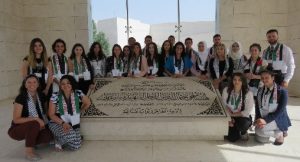 The KTH Delegation spent their fourth day in Ramallah, a beautiful city very different from any they had visited prior. Their first stop was Yasser Arafat’s tomb to pay their respects to the great leader of the PLO. Although many things have changed since his death, he is still greatly respected and loved by the Palestinian people. Afterward, the Delegates visited the Mahmoud Darwish Museum, where they learned about the life and work of Palestine’s national poet, Mahmoud Darwish. Darwish was born during the Nakba and lived the entirety of his life either under Israeli military rule or in exile. A symbol of Palestine’s struggle for freedom, his poems are known by heart by millions across Palestine and the Middle East. The Delegates were honored to learn more about his life and to read his poetry.
The KTH Delegation spent their fourth day in Ramallah, a beautiful city very different from any they had visited prior. Their first stop was Yasser Arafat’s tomb to pay their respects to the great leader of the PLO. Although many things have changed since his death, he is still greatly respected and loved by the Palestinian people. Afterward, the Delegates visited the Mahmoud Darwish Museum, where they learned about the life and work of Palestine’s national poet, Mahmoud Darwish. Darwish was born during the Nakba and lived the entirety of his life either under Israeli military rule or in exile. A symbol of Palestine’s struggle for freedom, his poems are known by heart by millions across Palestine and the Middle East. The Delegates were honored to learn more about his life and to read his poetry.
Their next stop was to meet with Dr. Hanan Ashrawi, a prominent Palestinian Legislator, Activist and Scholar. During their meeting, Dr. Ashrawi told the Delegates about her work, answering their many questions about unification, about the difficulties facing Palestine, about relations between competing political parties, and about the importance of Diaspora activism in the West. She offered a strong perspective that greatly impacted the Delegates’ views of Palestine and what they could do to help.
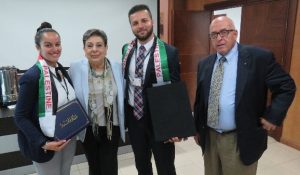 In the afternoon, the Delegates visited a youth center called Sareyyet Ramallah, the home of the first Scout Troop in Ramallah! It was a touching opportunity to see the youth of Palestine in action, creating joy for themselves despite the limitations imposed by the occupation. With offerings including basketball, swimming, dabke and leadership programs, Sareyyet Ramallah is truly a place for children and youth to learn, play, and enjoy life. Afterward, the Delegates visited Bank of Palestine’s headquarters learning about the many services they offer, including both financial and cultural ventures. The Bank of Palestine encouraged Delegates to stay involved in their homeland, noting that as Diaspora Palestinians, they have an important role to play in Palestine’s financial growth and development.
In the afternoon, the Delegates visited a youth center called Sareyyet Ramallah, the home of the first Scout Troop in Ramallah! It was a touching opportunity to see the youth of Palestine in action, creating joy for themselves despite the limitations imposed by the occupation. With offerings including basketball, swimming, dabke and leadership programs, Sareyyet Ramallah is truly a place for children and youth to learn, play, and enjoy life. Afterward, the Delegates visited Bank of Palestine’s headquarters learning about the many services they offer, including both financial and cultural ventures. The Bank of Palestine encouraged Delegates to stay involved in their homeland, noting that as Diaspora Palestinians, they have an important role to play in Palestine’s financial growth and development.
In the late afternoon, the Delegates had a group dabke lesson, where they learned about Palestine’s famed traditional dance. El Funoun group, one of the best and most active dance troupes in Palestine, hosted the Delegates for this unforgettable lesson. Although the Delegates worked up a sweat, it was undoubtedly a highlight of the trip!
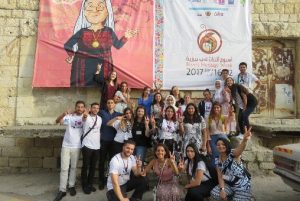
The delegates rounded off their day at the 7th Annual Rosanna Festival in the small town of Birzeit, just outside of Ramallah. There, they experienced a reenactment of a zaffe (henna party) and a traditional Palestinian wedding. Children performed poetry, and the delegates took in the many festival stalls and booths which offered traditional food and artisan crafts.
Although the Delegates were exhausted by the end of it, it was a fantastic day. They expressed feeling deeply connected with their culture as well as heartened to meet the past and present leaders of Palestine. However the most impactful event of the day was still to come.
On the way home to Bethlehem, the Delegates were stopped at a checkpoint where IDF soldiers boarded their bus and ordered them to show their passports. Their tour guide, who is Palestinian from Bethlehem, was ordered off the bus for further scrutiny. After some negotiation, he was allowed to re-embark the bus so long as the group took Palestinian roads. These roads are windy and much slower than the Israeli roads they had been using. The Delegates were shocked by the occurrence, realizing that they were protected by their Western passports. The experience cemented the occupation for them, and it is something they will not soon forget.
“The injustice and sheer arbitrariness of it [the bus incident] stood in stark contrast to the positive experiences of the day. I feel that every day, we are closer to understanding both the joy and the grief of being Palestinian in Palestine.” – Sara, KTH Delegate, United States
Visiting Hebron: A Fragile Tension between Uncertainty and Hope
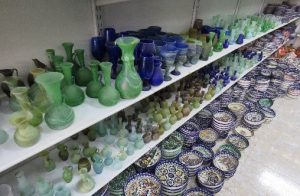 On the fifth full day of their journey, the KTH Delegation visited Hebron. Walking the streets of this important Palestinian city, Delegtes expressed feeling bombarded by the heaviness of life there. The harsh environment of this troubled city drove home for them the the unacceptable reality their fellow Palestinians go through every day.
On the fifth full day of their journey, the KTH Delegation visited Hebron. Walking the streets of this important Palestinian city, Delegtes expressed feeling bombarded by the heaviness of life there. The harsh environment of this troubled city drove home for them the the unacceptable reality their fellow Palestinians go through every day.
While browsing the shops in Hebron’s old city, Delegates sensed the people’s desperation by the way they pushed their wares onto the group. In a place almost entirely on lockdown by the surrounding Israeli settlement, these shop owners rely on the few string of tourists brave enough to traverse the Old City’s virtually empty streets. The Delegates were astonished by the stories they heard while in Hebron, many about the extrajudicial killings of Palestinians by Israeli Soldiers which have become so common in the region.
While in Hebron, the Delegates entered Ibrahimi Mosque, experiencing the Tombs of the Patriarchs. Afterward, Hebron’s Governorate hosted the Delegates for lunch, during which they heard from government officials about the city’s challenges and opportunities. Their day finished off with a speech from the President of Hebron’s Chamber of Commerce and Industry, which revealed the many intricacies of Palestinian markets, exports, and production centers.
“Hebron was a very distinct chapter in this book. On the one hand, we could see the potential and capacity for growth, and on the other, a full-on attempt to diminish the spirit of an oppressed people with fences, gates, and machine guns. At the end of the day, we were left with a fragile tension between uncertainty and hope.” – Richard, KTH Delegate, Honduras
Fostering Solidarity at the 6th Annual Palestinian Diaspora Conference
 On the sixth day of their journey, the KTH Delegation attended KTH’s 6th Annual Palestinian Diaspora Conference, hosted in partnership with Bethlehem University. During the conference, KTH Delegates met with Bethlehem University Student Ambassadors, learning about the challenges that Palestinian youth face, and sharing about their own personal experiences coming home. In the morning conference session, KTH Delegates were welcomed by Mr. Rateb Rabie, President/CEO of the Holy Land Ecumenical Foundation (HCEF) and Founder of KTH, by Dr. Michael Sansour, Executive Vice President of Bethlehem University, and by Mr. Kamel Husseini, Head of International and Investor Affairs at Bank of Palestine. Throughout the morning, Delegates heard from experts on Geopolitics, the Economy and the Tourist Industry in Palestine, including such notable guests as Dr. Jad Isaac, General Director of Applied Research Institute of Jerusalem (ARIJ), Mr. Raed Saadeh, Owner and General Manager of Jerusalem Hotel, and Mr. Kamel Husseini of Bank of Palestine.
On the sixth day of their journey, the KTH Delegation attended KTH’s 6th Annual Palestinian Diaspora Conference, hosted in partnership with Bethlehem University. During the conference, KTH Delegates met with Bethlehem University Student Ambassadors, learning about the challenges that Palestinian youth face, and sharing about their own personal experiences coming home. In the morning conference session, KTH Delegates were welcomed by Mr. Rateb Rabie, President/CEO of the Holy Land Ecumenical Foundation (HCEF) and Founder of KTH, by Dr. Michael Sansour, Executive Vice President of Bethlehem University, and by Mr. Kamel Husseini, Head of International and Investor Affairs at Bank of Palestine. Throughout the morning, Delegates heard from experts on Geopolitics, the Economy and the Tourist Industry in Palestine, including such notable guests as Dr. Jad Isaac, General Director of Applied Research Institute of Jerusalem (ARIJ), Mr. Raed Saadeh, Owner and General Manager of Jerusalem Hotel, and Mr. Kamel Husseini of Bank of Palestine.
During the afternoon session, Delegates participated in a roundtable focused on the significance of the group’s homecoming led by Dr. Saliba Sarsar, Jerusalem native and Professor of Political Science at Monmouth University and Chair of the HCEF Research and Publication Committee. Dr. Sarsar closed the roundtable session by emphasizing, “Leadership is not just about being at the head of the table by returning to Palestine, by choosing to learn about your land and heritage, you are exercising leadership.” After the roundtable, KTH Delegates met in small groups with Student Ambassadors to organize themselves for collective action. They developed a resolution that will serve as a guide for their collaborative work moving forward. Overall the day was both educational and inspiring, uniting Palestine in spirit and cause.
“Being able to see firsthand how Palestinians live, I see that the situation here is really difficult. I hope that we can make the situation better…working together, one step at a time, we can take back the land of Palestine, and help win more rights for Palestinians.” – Layla, KTH Delegate, United States
Home is Where the Heart Is
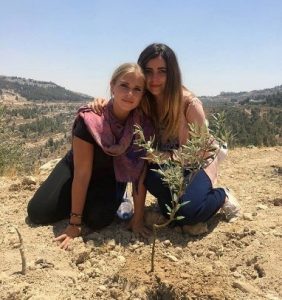 On the seventh day of their journey, the KTH Delegation embarked on a much anticipated KTH tradition: Family Day! On Family Day, Delegates spend the entire day with local families, learning about their lives, personal histories and communities. For many of the Delegates, Family Day was an opportunity to reconnect with family, meeting relatives that they had never seen before in person. Others were able to get a taste of renowned Palestinian hospitality, hosted by warm-hearted families eager to learn about their Palestinian brothers and sisters living in the Diaspora. The Delegates were welcomed home by families in Bethlehem, Beit Sahour, Beit Jala, Aida Refugee Camp, Ramallah, Burin, Beit Hanina, and Der Dibwan. Delegates spent the day cooking with their families, touring the city, and learning about local lives under Israeli occupation.
On the seventh day of their journey, the KTH Delegation embarked on a much anticipated KTH tradition: Family Day! On Family Day, Delegates spend the entire day with local families, learning about their lives, personal histories and communities. For many of the Delegates, Family Day was an opportunity to reconnect with family, meeting relatives that they had never seen before in person. Others were able to get a taste of renowned Palestinian hospitality, hosted by warm-hearted families eager to learn about their Palestinian brothers and sisters living in the Diaspora. The Delegates were welcomed home by families in Bethlehem, Beit Sahour, Beit Jala, Aida Refugee Camp, Ramallah, Burin, Beit Hanina, and Der Dibwan. Delegates spent the day cooking with their families, touring the city, and learning about local lives under Israeli occupation.
“It was a deeply emotional day for many of us, as this was a moment when we felt deeply welcomed by Palestinians in our homeland. We played with their children, ate their food, and helped to do dishes afterward. As our journey inches closer to the end, we feel more at home than ever.” – Sara, KTH Delegate, United States
Nablus’ Living Water
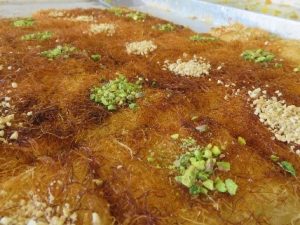 On the eighth day of their journey, the KTH Delegation visited Nablus. Their first stop was to the Samaritan region, where Delegates learned about the Samaritans’ efforts to preserve their dwindling community, which has existed there for over 2,500 years. With roughly 300 members living on Mt. Gerizim, the community continues to live under military occupation near an Israeli settlement. Afterward, Delegates toured various religious sites, among them, Jacobs well, the location of Jesus’ encounter with the Samaritan woman. There, the delegates had the opportunity to drink from the “living water” as well as test the depths of the 40-meter well. The delegates later toured Nablus’ Old City, taking in local history and visiting sites important to local culture and social life. Afterward, the Nablus Governorate hosted the Delegates for lunch where they met with local youth and were encouraged to keep their passion and creativity burning as they continue on in their various life paths. Their day ended with a taste of Nablus’ world famous dessert, Kannafeh.
On the eighth day of their journey, the KTH Delegation visited Nablus. Their first stop was to the Samaritan region, where Delegates learned about the Samaritans’ efforts to preserve their dwindling community, which has existed there for over 2,500 years. With roughly 300 members living on Mt. Gerizim, the community continues to live under military occupation near an Israeli settlement. Afterward, Delegates toured various religious sites, among them, Jacobs well, the location of Jesus’ encounter with the Samaritan woman. There, the delegates had the opportunity to drink from the “living water” as well as test the depths of the 40-meter well. The delegates later toured Nablus’ Old City, taking in local history and visiting sites important to local culture and social life. Afterward, the Nablus Governorate hosted the Delegates for lunch where they met with local youth and were encouraged to keep their passion and creativity burning as they continue on in their various life paths. Their day ended with a taste of Nablus’ world famous dessert, Kannafeh.
Witnessing Northern Resilience
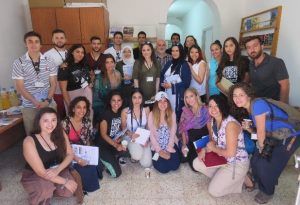 The KTH Delegation spent Monday and Tuesday in the Northern region of Palestine, called Al-Galeel, or Galilee. They began their visit in Haifa, a beautiful city that hugs the Mediterranean coastline. Although Haifa is a formerly Palestinian city, it is now mixed, making it an interesting opportunity to learn about how Palestine has changed over the years. While there, the Delegation toured the Baha’i Gardens, a place sacred to adherents of the Baha’i faith, and visited the Stella Maris Monastery, offering them an opportunity to experience the various faiths that call Palestine home.
The KTH Delegation spent Monday and Tuesday in the Northern region of Palestine, called Al-Galeel, or Galilee. They began their visit in Haifa, a beautiful city that hugs the Mediterranean coastline. Although Haifa is a formerly Palestinian city, it is now mixed, making it an interesting opportunity to learn about how Palestine has changed over the years. While there, the Delegation toured the Baha’i Gardens, a place sacred to adherents of the Baha’i faith, and visited the Stella Maris Monastery, offering them an opportunity to experience the various faiths that call Palestine home.
Afterward, the group traveled to Akka, the “citadel on the sea,” which helped them to get a glimpse into Old Palestine. In Akka’s Old City, the Delegation visited the local souq (market) and Al Jizar Mosque, which has watched over Akka for centuries. Later in the day, the Delegation visited small Palestinian villages (Kfar Yasif and Iqrit), meeting with their community leaders and learning about their particular histories and challenges.
On their second day in the North, the Delegation visited Nazareth and Jaffa. They toured the Old City in both, seeing markets and talking to Palestinians there. They quickly learned that Palestinians living in the North face different obstacles than their counterparts living in the West Bank. Instead of military occupation, people in the North must contend with the ever-present threat of assimilation. Nevertheless, Palestinians living in Israel have thus far been able to keep their culture alive. One especially impactful experience was when the Delegates overheard an Israeli birthright tour, in which the tour guide was telling his tour group that Yaffa was nothing but sand before the Zionists build Tel Aviv. Although the Delegation was dismayed to witness firsthand Israel’s attempt to erase Palestinian culture, they were heartened by the Palestinian community’s resilience.
“Presence is Resistance”
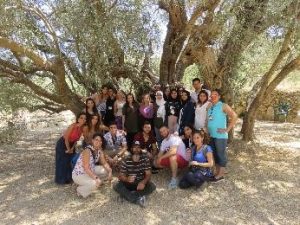 On Wednesday, July 19th, after a lightning fast two-week journey, KTH’s 2017 Delegation bid farewell to Palestine. The Delegates started their day at the Joint Advocacy Initiative in Beit Sahour, an initiative that works to raise awareness about the challenges of Palestinian farmers through their Olive Tree Campaign which plants, nurtures and harvests olive tree groves. During their morning program, Delegates learned about the realities of land confiscation and settlement attacks, hearing from Palestinian farmers in the village of Al-Walaja about how their olive tree groves are affected by the occupation. As part of their educational tour, the Delegates also visited Al Badawi olive tree, believed to be the oldest olive tree in the world, dating back 5,500 years, and together, planted three olive trees to symbolize their commitment to nurturing Palestine.
On Wednesday, July 19th, after a lightning fast two-week journey, KTH’s 2017 Delegation bid farewell to Palestine. The Delegates started their day at the Joint Advocacy Initiative in Beit Sahour, an initiative that works to raise awareness about the challenges of Palestinian farmers through their Olive Tree Campaign which plants, nurtures and harvests olive tree groves. During their morning program, Delegates learned about the realities of land confiscation and settlement attacks, hearing from Palestinian farmers in the village of Al-Walaja about how their olive tree groves are affected by the occupation. As part of their educational tour, the Delegates also visited Al Badawi olive tree, believed to be the oldest olive tree in the world, dating back 5,500 years, and together, planted three olive trees to symbolize their commitment to nurturing Palestine.
Later in the day, the Delegates journeyed to a Bedouin encampment in Al-Rashayde, located in the desert between Palestine and Jordan. After a short stop to take in the majestic view of the Dead Sea from the desert sand dunes, the delegates retreated to the tent where they heard from the local Sheikh and other Bedouin community members about the particular struggles of their community. In the evening, the Delegates took in local Bedouin culture, including traditional dance, music, Palestinian barbeque, and of course, their generous and loving hospitality.
“The KTH journey has been the most influential experience of my life.” – Mohammed, KTH Delegate, United States
Although our 2017 KTH Delegation to “Explore and Live” Palestine has ended, the real journey has just begun. KTH is eager to see what the 2017 Delegation will do with their newfound knowledge and commitment.
For the full alb om of KTH 2017 Delegation, please click here.
